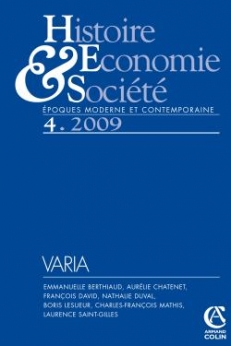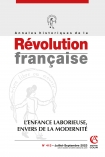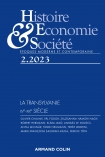
Histoire, économie & société (4/2009)
Pour acheter ce numéro, contactez-nous
Recevez les numéros de l'année en cours et accédez à l'intégralité des articles en ligne.
À l’époque moderne, se développe une littérature visant à réhabiliter le rôle des femmes au sein du mariage chrétien. Ces manuels, qui se diffusent à l’échelle européenne, cherchent à préparer les jeunes filles à leurs futures tâches et proposent un idéal d’épouse dévouée, obéissante, et de mère attentive. Ces ouvrages prescriptifs abordent de façon globale les devoirs de la femme mariée et s’attardent sur son rôle quotidien au sein de la maison. Si les conduct books anglais ont été bien étudiés, les manuels français du XVIIIe siècle restent encore largement sous-exploités. L’étude d’un corpus de manuels exposant le rôle des femmes dans l’économie domestique au XVIIIe siècle permet d’analyser comment se construit un discours visant à la fois à cantonner les femmes dans la sphère domestique tout en leur concédant un pouvoir sur la maisonnée. Si le rôle des femmes est largement affirmé, valorisé, et précisément décrit, il n’est cependant vu que comme une délégation d’une autorité qui reste fondamentalement masculine. Ce portrait d’une épouse modèle soulève ainsi la question des rapports entre hommes et femmes, interroge le problème du partage des tâches dans le couple et, au-delà, questionne la nature du pouvoir des femmes. Ces problématiques, qui sont au coeur des enjeux de l’histoire des femmes, invitent également à saisir comment, à partir de ces prescriptions, les femmes ont pu négocier et se créer des espaces de liberté.
In the modern era, a literature that aims at rehabilitating women’s role within the Christian marriage develops. These manuals, which spread on the European scale, try to prepare young girls to their future tasks and offer an ideal of a devoted and obedient wife, and careful mother. These conduct books, on the whole, deal with the wife’s duties and focus on her daily role in her household. If the English conduct books have been well studied, the French ones from the eighteenth century still remain unexplored. The study of a corpus of French manuals describing women’s role in the eighteenth century domestic economy allows to analyse how is built a discourse which aims at confining women to the domestic sphere while conceding them power in the household. Even if women’s role is largely affirmed, promoted and precisely described, it is only seen as a delegation of the authority that still remains fundamentally masculine. This portrait of an ideal wife raises the question of relationships between men and women. It also brings up the problem of the sharing of the tasks in the couple, and beyond it questions the nature of women’s power. These issues, which are at the heart of the Gender History stakes, also invite to understand how, from these prescriptions, women have been able to negotiate and create for themselves areas of liberty.

